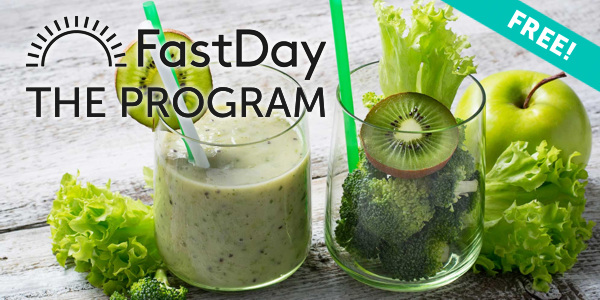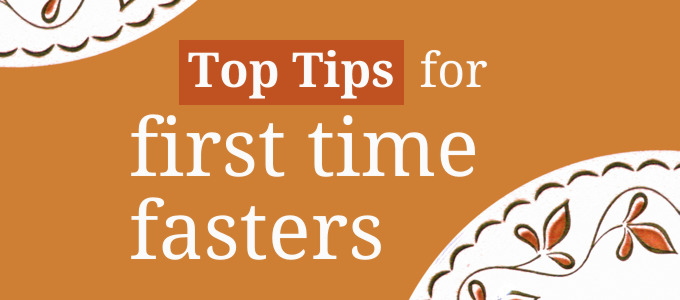One of the most common questions which I’m asked by newbies to the 5:2 Diet via Twitter, the forum, Facebook and email is “got any tips?“.
Indeed I do! I’ve been doing this for close to a year now, and these are the things I would say are most important for first time fasters when embarking on their first 5:2 diet fasting day.
1. Don’t be afraid!
This seems to be a really common feeling among first time fasters – fear. What are they afraid of? Usually, hunger. Around the world people live with hunger every day and survive, really there’s no need for anyone in a developed nation to worry about eating rather less a couple of days a week. Hunger is not something to be afraid of even if it is something of an unknown to many of us. We’re so used to just eating something the minute we feel peckish. People seem to think that hunger will just get progressively worse if not fed, but as Dr Mosley described on Eat, Fast and Live Longer, hunger comes in waves. It passes. It’s really nothing to be afraid of and when you learn to accept hunger and ignore it there is a certain kind of smugness one can enjoy at the sense of control this gives you over your body’s urges. Don’t be afraid, be proud of yourself for what you’re doing and what you’re going to achieve through it. A bit of willpower goes a long way and ‘dieting’ just twice a week really can change your life.
2. Drink Water. Plenty of it.
Did you know that more often than not, what we think is hunger is actually thirst? Most people don’t drink enough clear fluids. On a fasting day water really is your friend.
Feeling hungry? Have a glass of water – it will fill you up or quench that thirst you mistook for hunger!
Feeling tired? You’re probably dehydrated. Have a glass of water!
Got a headache? You may be dehydrated. Have a glass of water!
Noticing a theme here? Water is great. For the first few months I drank so much water on my fast days that I was up and down to the loo like a… um… person who has drunk too much water. With time, you learn to deal with the hunger and the other minor side effects tend to fade too – and with that your water consumption will probably decrease too.
3. Plan your fasting day meals
In the early days of fasting the last thing you want is to be going out food shopping trying to find what you’re going to eat! Decide ahead of time how you plan to spend your calories and stick with it. Buy things in advance, and if you don’t think you can face cooking on the day you can even prepare meals ahead of time. I love to batch cook some of my 5:2 dinner favourites and have a freezer full of yummy things like Quorn Bolognese, chilli, ratatouille, lasagne and more! While processed foods aren’t generally recommended in a healthy diet, you may find it easier to simply buy in a quality ready meal or two for your fasting days, no need to cook or count the calories – just bung it in the microwave and voila! Instant calorie-counted meal. Too many calories in the ready meal you want? Use half of it, bulk out with steamed veg (another pre-calorie-counted microwavable delight) and save the other half for another day. Simple!
3. Keep Busy!
Few things make a fast day more difficult than a day where there’s nothing to do. Time drags by and makes it seem difficult, particularly if you are used to eating often. Keeping busy on your fast day will make it go by more quickly and of course be more enjoyable! The more time you spend doing other things the less time you’ll spend thinking about food. Believe me a lot of newbie fasters will spend a great deal of time thinking about food – and fantasizing about the amazing breakfast they want to have the next day! Oddly enough come the next morning most of us find we’re not the ravenous fiends we expect to be and are happy to have a normal breakfast. If you’ve got nothing to keep you busy on your fasting day, why not have a good old read around the 5:2 forum and join in some of the conversations there? It’s a great time killer and you’re bound to pick up some great tips & advice about this way of eating as well as making some new 5:2er friends to support you on your weight loss journey! Alternatively why not go for a walk or do some exercise? You may well burn more fat while fasting and somehow it feels really good to break a sweat on a fast day. Actually, it’s a great way to distract from the hunger too. Spend your lunch break at the gym or have a walk around the block!
4. Don’t eat until you’re really hungry.
This is something you’ll probably have to adjust to over time, since you may not really know what hunger feels like beyond the usual peckish feeling. The longer you can wait before you eat, the longer fasting period you get in and the more time your body has to try to burn off some fat reserves. On top of this a great many of us at the forum have reported that the moment we eat something on a fast day, we start to feel hungry. It’s often easier to go without rather than kick starting the appetite and because of this a lot of Fast Dieters choose to save the majority of their calories for their evening meal. You can have a really good meal for around 500 calories and it’s well worth waiting for. There’s an interesting topic about ‘The Hunger Switch’ at the forum which you might find useful. Remember the 5:2 diet is really flexible and you may need to experiment a bit to find out what works best for you in terms of dealing with hunger, when you need to eat and what sort of foods work best for you on a fasting day.
5. Headache tablets – don’t have them? Buy some!
Yes, a lot of people find they get headaches during their first few fasts. If a glass of water doesn’t fix it, don’t be afraid to take some headache tablets. Just make sure you check whether they’re okay to take on an empty stomach – aspirin based pills are a no-go, but paracetamol should be fine. Headaches can also be a sign of withdrawal symptoms, most often from sugar or caffeine. Sugar is something you should try to avoid on a fasting day if possible as it often makes you more hungry, caffeine on the other hand is fine and will help keep those withdrawal headaches at bay. Just remember black coffee and black tea are calorie free but if you’re adding sugar, sweeteners or milk you need to count those calories!
6. Don’t overload your tummy the next day (listen to your body)
Okay, so strictly speaking this isn’t for your first fast day, but it’s an important one. I’ve noticed people reporting tummy pains the day after their first few fasts, or a sudden dash to the toilet after eating (someone at the forum referred to this as ‘rapid transit’, which tickles me!). This generally doesn’t mean something is wrong and in my experience it is usually a case of overloading your stomach with food after a fast. Maybe you ate breakfast even though you didn’t feel hungry (you’ll soon learn not to do this!), maybe you had a normal sized breakfast but your body only needed a small one. Maybe you just needed to wait until mid morning before your first meal. There’s a lot of conflicting information online about whether breakfast is really as important as it’s made out to be. There are arguments on both sides but I would say that one of the greatest things about 5:2 is how it gets you back in tune with your body’s needs. If your body has complained about something you’ve put in it, learn to listen. Feed it at a different time, feed it less, feed it something else. Work out what it needs rather than what you want and go with that. You’ll be glad you did 🙂 I almost never have breakfast before 10.30am these days and quite often it’s nearer lunch time before hunger actually kicks in. For years I’ve eaten breakfast because it’s what we’re told to do, but I seldom actually woke up hungry. But that’s an article for another time methinks!
Well those are my top 5:2 tips, but I’m sure there are plenty more that other Fast Dieters can offer you! There’s a whole thread of 5:2 tips & advice at the forum which you can read here.
There was also a video on YouTube with some great advice for newbies, unfortunately it seems to have been taken down – however the site which posted it still includes the article which went with it, which you can read here.
And don’t forget – it does get easier!





